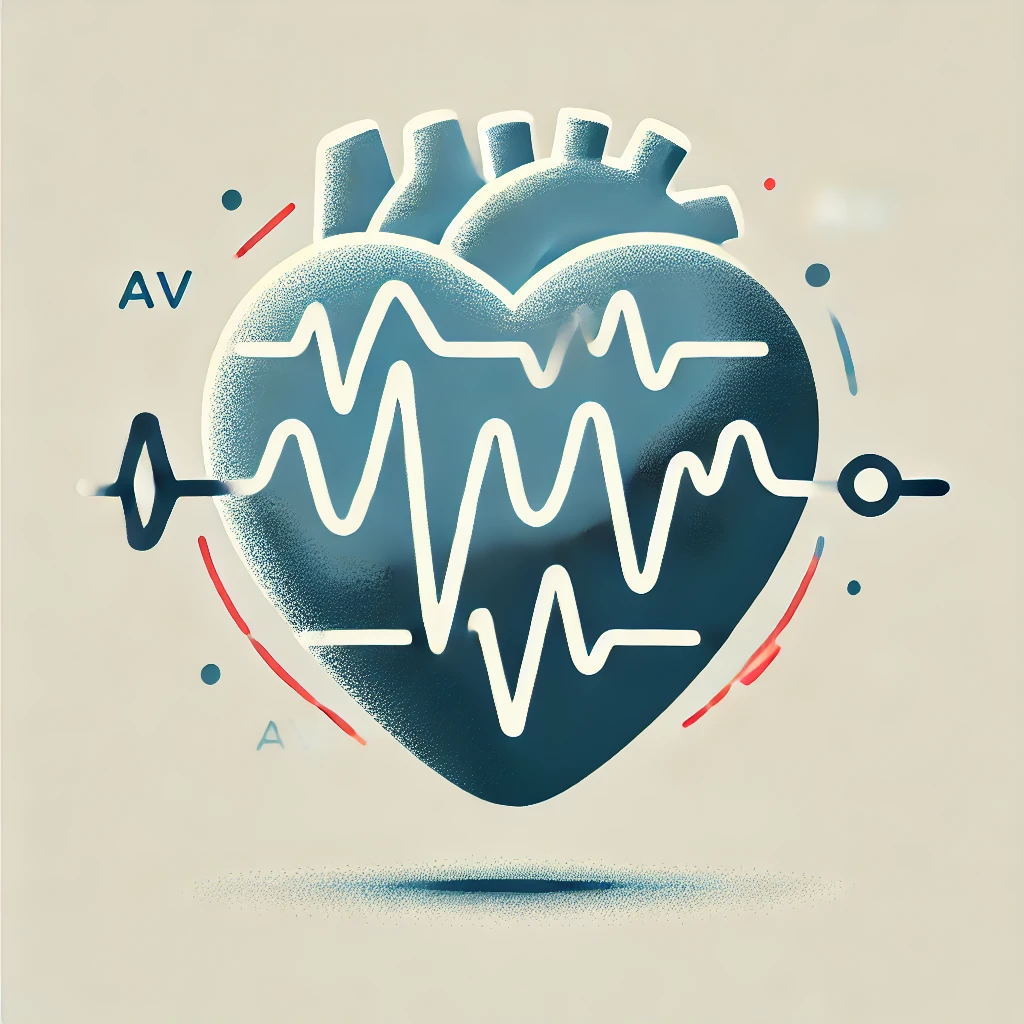Atrioventricular (AV) block is an abnormal delay or interruption in the conduction of electrical impulses from the atria to the ventricles. It can range from mild (first-degree block) to severe (third-degree block, complete heart block). Recognizing AV block on an ECG is critical, as higher-degree blocks may require pacemaker implantation.
2. Classification of AV Blocks
| Type | ECG Findings | Clinical Features |
|---|---|---|
| First-Degree AV Block | PR interval >200ms (prolonged but constant) | Usually asymptomatic |
| Second-Degree AV Block – Mobitz Type I (Wenckebach) | Progressive PR prolongation → Dropped QRS | May cause dizziness, rarely progresses |
| Second-Degree AV Block – Mobitz Type II | Sudden dropped QRS complexes without PR prolongation | Often symptomatic, high risk of complete heart block |
| Third-Degree AV Block (Complete Heart Block) | Atria and ventricles beat independently (no AV conduction) | Severe bradycardia, syncope, requires urgent pacing |
3. Causes of AV Block
| Category | Causes |
|---|---|
| Intrinsic Conduction Disease | Age-related fibrosis, idiopathic degeneration |
| Ischemic Heart Disease | Inferior MI (AV node ischemia), anterior MI (His-Purkinje damage) |
| Electrolyte Imbalances | Hyperkalemia, hypermagnesemia |
| Drugs | Beta-blockers, calcium channel blockers, digoxin, amiodarone |
| Infections & Inflammation | Lyme disease, myocarditis, rheumatic fever |
| Neuromuscular Disorders | Muscular dystrophy, amyloidosis |
4. ECG Findings of AV Blocks
(A) First-Degree AV Block
📌 PR interval >200ms, no dropped beats.
🔹 Benign, no intervention needed unless symptomatic.
(B) Second-Degree AV Block
1️⃣ Mobitz Type I (Wenckebach)
📌 Progressive PR prolongation → Dropped QRS
🔹 Usually benign, worsens with vagal stimulation (e.g., carotid massage).
2️⃣ Mobitz Type II
📌 Dropped QRS without PR prolongation
🚨 Can progress to complete heart block – requires pacemaker
(C) Third-Degree (Complete) Heart Block
📌 Atria and ventricles contract independently (AV dissociation)
🚨 Severe bradycardia, high risk of asystole – requires pacemaker
5. Diagnosis and Evaluation
| Investigation | Purpose |
|---|---|
| ECG | Identifies type of AV block |
| Electrolyte Panel | Checks for hyperkalemia, hypocalcemia |
| Cardiac Biomarkers | Evaluates for ischemic causes (MI) |
| Echocardiography | Assesses structural heart disease |
| Holter Monitoring | Detects intermittent AV block |
| Lyme Serology | If Lyme disease is suspected |
6. Management of AV Blocks
(A) First-Degree AV Block
✔️ No treatment needed if asymptomatic.
✔️ Review medications (reduce beta-blockers, calcium channel blockers if prolonged PR).
(B) Second-Degree AV Block
1️⃣ Mobitz Type I (Wenckebach)
✔️ No intervention if asymptomatic.
✔️ Atropine if bradycardic (temporary relief).
✔️ Monitor for progression if symptomatic.
2️⃣ Mobitz Type II
🚨 Requires pacemaker (high risk of complete heart block).
✔️ Temporary pacing if unstable (until permanent pacemaker placement).
(C) Third-Degree (Complete) AV Block
🚨 Emergency management required!
✔️ Immediate transcutaneous or transvenous pacing if unstable.
✔️ Permanent pacemaker implantation is definitive treatment.
7. Complications of AV Block
🚨 Progression to complete heart block (Mobitz II, bifascicular block)
🚨 Sudden cardiac arrest (especially in severe bradycardia)
🚨 Heart failure due to poor cardiac output
8. Key Takeaways
✅ First-degree AV block is usually benign; Mobitz II and complete block require pacing.
✅ Wenckebach (Mobitz I) improves with exercise, while Mobitz II worsens.
✅ Permanent pacemaker is required for symptomatic or high-risk blocks.
✅ Always assess reversible causes (drugs, electrolytes, infections).
Further Reading
- NHS Overview of AV Blocks: NHS UK
- European Society of Cardiology (ESC) Guidelines: ESC Guidelines

